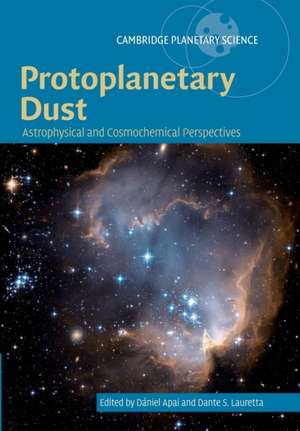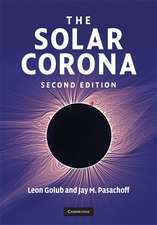Protoplanetary Dust: Astrophysical and Cosmochemical Perspectives: Cambridge Planetary Science
Editat de Dániel Apai, Dante S. Laurettaen Limba Engleză Paperback – 19 feb 2014
Din seria Cambridge Planetary Science
-
 Preț: 401.86 lei
Preț: 401.86 lei - 14%
 Preț: 751.63 lei
Preț: 751.63 lei - 9%
 Preț: 871.58 lei
Preț: 871.58 lei - 8%
 Preț: 521.68 lei
Preț: 521.68 lei - 11%
 Preț: 579.05 lei
Preț: 579.05 lei - 14%
 Preț: 716.10 lei
Preț: 716.10 lei -
 Preț: 446.28 lei
Preț: 446.28 lei - 11%
 Preț: 506.54 lei
Preț: 506.54 lei -
 Preț: 337.66 lei
Preț: 337.66 lei - 14%
 Preț: 941.54 lei
Preț: 941.54 lei - 11%
 Preț: 587.99 lei
Preț: 587.99 lei - 14%
 Preț: 1260.55 lei
Preț: 1260.55 lei - 23%
 Preț: 1135.26 lei
Preț: 1135.26 lei -
 Preț: 353.83 lei
Preț: 353.83 lei - 14%
 Preț: 1033.36 lei
Preț: 1033.36 lei - 14%
 Preț: 908.92 lei
Preț: 908.92 lei -
 Preț: 446.87 lei
Preț: 446.87 lei - 11%
 Preț: 597.23 lei
Preț: 597.23 lei -
 Preț: 400.70 lei
Preț: 400.70 lei -
 Preț: 357.51 lei
Preț: 357.51 lei -
 Preț: 350.76 lei
Preț: 350.76 lei - 14%
 Preț: 1056.97 lei
Preț: 1056.97 lei - 19%
 Preț: 734.95 lei
Preț: 734.95 lei - 23%
 Preț: 826.95 lei
Preț: 826.95 lei - 20%
 Preț: 474.96 lei
Preț: 474.96 lei
Preț: 458.24 lei
Nou
Puncte Express: 687
Preț estimativ în valută:
87.73€ • 91.53$ • 73.54£
87.73€ • 91.53$ • 73.54£
Carte tipărită la comandă
Livrare economică 13-27 martie
Preluare comenzi: 021 569.72.76
Specificații
ISBN-13: 9781107629424
ISBN-10: 110762942X
Pagini: 396
Dimensiuni: 170 x 244 x 21 mm
Greutate: 0.63 kg
Editura: Cambridge University Press
Colecția Cambridge University Press
Seria Cambridge Planetary Science
Locul publicării:New York, United States
ISBN-10: 110762942X
Pagini: 396
Dimensiuni: 170 x 244 x 21 mm
Greutate: 0.63 kg
Editura: Cambridge University Press
Colecția Cambridge University Press
Seria Cambridge Planetary Science
Locul publicării:New York, United States
Cuprins
Preface; 1. Planet formation and protoplanetary dust Daniel Apai and Dante Lauretta; 2. The origins of protoplanetary dust and the formation of accretion disks Hans-Peter Gail and Peter Hope; 3. Evolution of protoplanetary disk structures Fred Ciesla and Cornelius P. Dullemond; 4. Chemical and isotopic evolution of the solar nebula and protoplanetary disks Dmitry Semenov, Subrata Chakraborty and Mark Thiemens; 5. Laboratory studies of simple dust analogs in astrophysical environments John R. Brucato and Joseph A. Nuth III; 6. Dust composition in protoplanetaty dust Michiel Min and George Flynn; 7. Dust particle size evolution Klaus M. Pontoppidan and Adrian J. Brearly; 8. Thermal processing in protoplanetary nebulae Daniel Apai, Harold C. Connolly Jr. and Dante S. Lauretta; 9. The clearing of protoplanetary disks and of the protosolar nebula Ilaira Pascucci and Shogo Tachibana; 10. Accretion of planetesimals and the formation of rocky planets John E. Chambers, David O'Brien and Andrew M. Davis; Appendixes; Glossary; Index.
Recenzii
'Protoplanetary Dust is a terrific edition (No. 12) to the Cambridge Planetary Science Series. … This book should be required reading for all cosmochemists (and astronomers), and it would serve as a excellent text for an interesting graduate course on the origin of solar systems.' Geochemical News
'… an excellent read, very much at the research edge in the field, and very up to date in the sources used. I would recommend it highly to graduate students, but also for the bookshelves of professionals in the field.' The Observatory
'… can be recommended not only to planetary scientists working in the field of planet formation but also to students who seek an introduction to this enormously challenging topic. The organization of the contents makes it possible to concentrate on certain aspects, as few people will be experts in all topics. Having the book on your shelf gives you the confidence that the comprehensive overview of the history of solids in our solar system from a simple grain to the beautiful planet we live on is just a move away.' Ruth Ziethe, European Space Research and Technology Centre, European Space Agency
'… an excellent read, very much at the research edge in the field, and very up to date in the sources used. I would recommend it highly to graduate students, but also for the bookshelves of professionals in the field.' The Observatory
'… can be recommended not only to planetary scientists working in the field of planet formation but also to students who seek an introduction to this enormously challenging topic. The organization of the contents makes it possible to concentrate on certain aspects, as few people will be experts in all topics. Having the book on your shelf gives you the confidence that the comprehensive overview of the history of solids in our solar system from a simple grain to the beautiful planet we live on is just a move away.' Ruth Ziethe, European Space Research and Technology Centre, European Space Agency
Descriere
The first comprehensive overview of planet formation for students and researchers in astronomy, cosmochemistry, laboratory astrophysics and planetary sciences.







